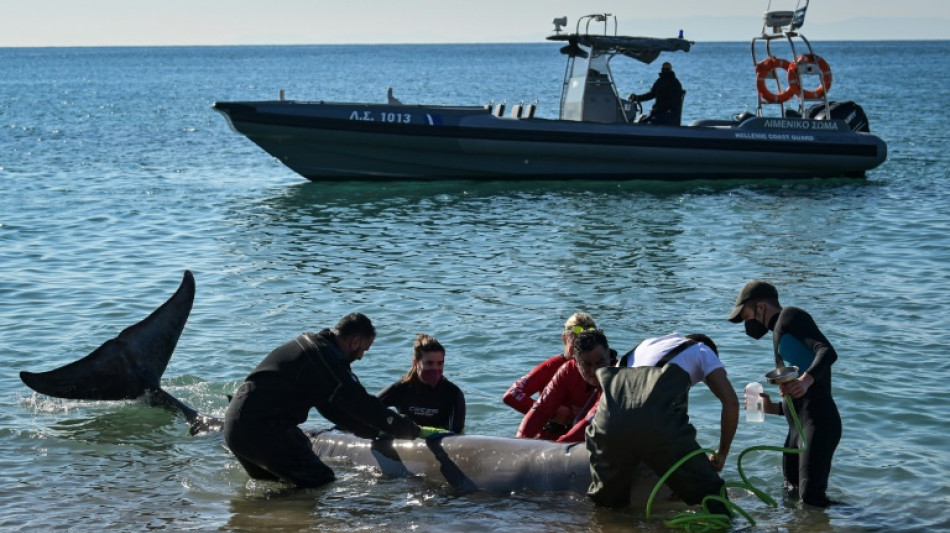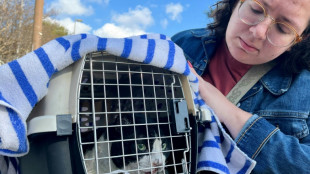
-
 Indonesia's Mount Ibu erupts more than 1,000 times this month
Indonesia's Mount Ibu erupts more than 1,000 times this month
-
Sumo to stage event in Paris as part of global push

-
 Deadly strikes on Gaza after Israel says ceasefire delayed
Deadly strikes on Gaza after Israel says ceasefire delayed
-
Badosa 'loves Coco' but is gunning for 'revenge' in Melbourne quarters

-
 Sabalenka, Gauff on Melbourne collision course as Alcaraz moves on
Sabalenka, Gauff on Melbourne collision course as Alcaraz moves on
-
Alcaraz into Australian Open quarters after Draper retires

-
 Sabalenka uses fighting spirit to banish Australian Open blues
Sabalenka uses fighting spirit to banish Australian Open blues
-
Sabalenka, Gauff on Melbourne collision course after reaching quarters

-
 Swiss rider Ruegg wins opening UCI World Tour event in Australia
Swiss rider Ruegg wins opening UCI World Tour event in Australia
-
Mitchell scores 36 as Cavs bounce back, Celtics downed

-
 Sabalenka a happy snapper at Australian Open
Sabalenka a happy snapper at Australian Open
-
Gauff turns up heat on Bencic to reach Australian Open quarters

-
 Commanders stun Lions in NFL thriller, Chiefs advance
Commanders stun Lions in NFL thriller, Chiefs advance
-
Protesters storm S. Korea court after president's detention extended

-
 TikTok notifies US users of shutdown as Trump seeks last-ditch solution
TikTok notifies US users of shutdown as Trump seeks last-ditch solution
-
Ceasefire in Israel-Hamas war to begin at 0630 GMT

-
 Wuhan keen to shake off pandemic label five years on
Wuhan keen to shake off pandemic label five years on
-
Sabalenka imperious as Djokovic, Alcaraz on Melbourne collision course

-
 'Generational problem': Youth still struggling in pandemic's shadow
'Generational problem': Youth still struggling in pandemic's shadow
-
Vaccine misinformation: a lasting side effect from Covid

-
 Sabalenka blows away Andreeva to reach Melbourne quarter-finals
Sabalenka blows away Andreeva to reach Melbourne quarter-finals
-
Hope, fear at Paris rally for Gaza hostages

-
 Separated by LA wildfires, a happy reunion for some pets, owners
Separated by LA wildfires, a happy reunion for some pets, owners
-
France's Moutet 'collapsed in shower' before Australian Open match

-
 In US, teleworkers don't want to turn back
In US, teleworkers don't want to turn back
-
Covid's origins reviewed: Lab leak or natural spillover?

-
 Trump arrives in Washington ahead of Monday's inauguration
Trump arrives in Washington ahead of Monday's inauguration
-
Steady Straka takes four-shot lead in PGA Tour's American Express

-
 Kelce, Mahomes double-act leads Chiefs past Texans in NFL playoffs
Kelce, Mahomes double-act leads Chiefs past Texans in NFL playoffs
-
Barcelona's Balde complains of racist abuse in Getafe draw

-
 Frustrated Barca fail to capitalise on Atletico La Liga slip
Frustrated Barca fail to capitalise on Atletico La Liga slip
-
More Kenyan police land in Haiti to bolster security mission

-
 McGlynn leads youthful USA to friendly win over Venezuela
McGlynn leads youthful USA to friendly win over Venezuela
-
Barcelona stumble to frustrating Getafe draw in title setback

-
 Lukaku fires Napoli six points clear at Atalanta, Juve sink Milan
Lukaku fires Napoli six points clear at Atalanta, Juve sink Milan
-
Milder winds help LA firefighters as Trump vows to visit

-
 S. Korean court extends impeached president's detention, angering supporters
S. Korean court extends impeached president's detention, angering supporters
-
Wirtz has Leverkusen on Bayern's heels to keep repeat title 'dream' alive

-
 Arsenal must take blame for Villa fightback: Arteta
Arsenal must take blame for Villa fightback: Arteta
-
Nunez late show extends Liverpool's lead, Arsenal held by Aston Villa

-
 Russian attacks kill six across Ukraine, Kyiv says
Russian attacks kill six across Ukraine, Kyiv says
-
Northampton, Leinster claim Champions Cup pool top spots

-
 Arsenal's title bid rocked by Villa fightback
Arsenal's title bid rocked by Villa fightback
-
Superb Wirtz keeps Leverkusen on pace with leaders Bayern

-
 Detention extended for S. Korea's impeached president
Detention extended for S. Korea's impeached president
-
Thousands attend funeral of Liberian ex-warlord Prince Johnson

-
 Barcola strikes as PSG fight back to beat Lens
Barcola strikes as PSG fight back to beat Lens
-
Juventus into Serie A Champions League spots with victory over AC Milan

-
 Kane calls on Bayern to extend with pal Dier
Kane calls on Bayern to extend with pal Dier
-
Kenya sends 217 more police officers to Haiti mission


Wounded whale found dead on Greek island
A young whale that washed up near Athens last week was found dead on a nearby island Wednesday despite "superhuman" efforts to save the wounded animal, the Greek government said.
The male Cuvier's beaked whale was first found on a beach south of the Greek capital late last week. Experts quickly gave it hydration and antibiotics before returning it to the sea on Friday evening.
The dolphin-like whale had a badly wounded lower jaw, however, which experts said was likely made by a ship's propellers, and hopes were not high for its survival.
A coastguard boat looking out for the whale found its remains Wednesday on the eastern coast of Salamis Island, west of Athens, the environment ministry said.
A team of veterinarians and experts recovered the whale to carry out tests to determine whether it had any disease or injury of public significance, the ministry said.
"Despite the superhuman efforts made since last Friday by the coastguard and navy divers as well as specialised veterinarians, nurses and volunteers... unfortunately the young whale did not survive," deputy environment minister Georgios Amyras said.
"From the first clinical and blood tests that were carried out on the whale, we knew that the results were not encouraging, but we did everything humanly possible to save it."
Although sightings of live whales are extremely unusual in Athens, whale carcasses occasionally wash up, mainly on the Greek islands.
Cuvier's beaked whales, which can grow up to seven metres (23 feet) long, often fall prey to ship propellers but are also acutely sensitive to "noise pollution" from human activity, Natascha Komninou, a professor at the University of Thessaloniki, told Skai TV.
M.White--AT




